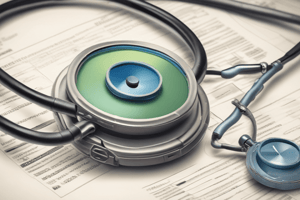Podcast
Questions and Answers
What does the Privacy Rule of HIPAA primarily govern?
What does the Privacy Rule of HIPAA primarily govern?
- Safeguarding electronic patient information
- Training healthcare staff on HIPAA regulations
- The protection of patient health information (correct)
- Reporting data breaches to authorities
Which right is NOT afforded to patients under HIPAA?
Which right is NOT afforded to patients under HIPAA?
- Right to restrict the sharing of their PHI
- Right to access their health records
- Right to request corrections to their information
- Right to receive payment for medical services (correct)
Why is compliance training mandatory for healthcare employees?
Why is compliance training mandatory for healthcare employees?
- To meet legal requirements under HIPAA (correct)
- To facilitate better staff communication
- To improve patient care quality
- To increase hospital revenue
Which of the following is NOT a component of the Security Rule?
Which of the following is NOT a component of the Security Rule?
What is the timeframe for notifying individuals after a data breach occurs?
What is the timeframe for notifying individuals after a data breach occurs?
Which of the following is a right that patients have under HIPAA?
Which of the following is a right that patients have under HIPAA?
Which aspect of HIPAA compliance emphasizes the importance of reporting violations?
Which aspect of HIPAA compliance emphasizes the importance of reporting violations?
Which of the following is essential for safeguarding electronic PHI as per the Security Rule?
Which of the following is essential for safeguarding electronic PHI as per the Security Rule?
What must covered entities do if a breach affects 500 or more individuals?
What must covered entities do if a breach affects 500 or more individuals?
Which option describes the purpose of a risk analysis under the Security Rule?
Which option describes the purpose of a risk analysis under the Security Rule?
Flashcards are hidden until you start studying
Study Notes
HIPAA Compliance
-
HIPAA Overview
- Health Insurance Portability and Accountability Act
- Established to protect patient health information (PHI)
-
Privacy Rule
- Sets standards for the protection of PHI
- Applies to covered entities (healthcare providers, plans, clearinghouses) and their business associates
- Patients have the right to:
- Access their health records
- Request corrections to their information
- Receive a notice of privacy practices
- Limit disclosures of their PHI
-
Patient Rights
- Right to obtain copies of health records
- Right to request amendments to health information
- Right to receive an accounting of disclosures
- Right to request restrictions on disclosures
- Right to confidential communications
-
Compliance Training
- Mandatory for all employees in healthcare settings
- Aims to educate staff on HIPAA regulations and privacy practices
- Regular training updates required to ensure ongoing compliance
- Emphasizes the importance of safeguarding PHI and reporting violations
-
Security Rule
- Establishes standards for safeguarding electronic PHI (ePHI)
- Requires administrative, physical, and technical safeguards
- Key provisions include:
- Risk analysis and management
- Access controls
- Audit controls
- Data encryption
- Secure data transmission
-
Breach Notification
- Requires covered entities to notify affected individuals of a data breach
- Notifications must be made within 60 days of discovering the breach
- If a breach affects 500 or more individuals, the Secretary of Health and Human Services must also be notified
- Public notice may be required if a large number of individuals are affected
Conclusion
Understanding HIPAA compliance is vital for healthcare professionals to ensure the protection of patient information and to avoid legal repercussions. Regular training and adherence to the Privacy and Security Rules, along with appropriate response to breaches, are essential components of compliance.
HIPAA Compliance
-
HIPAA Overview
- Enacted to safeguard patient health information (PHI)
- Aims to enhance the portability of health insurance while ensuring data confidentiality and security
-
Privacy Rule
- Creates standards for protecting PHI
- Applicable to covered entities, including healthcare providers, insurance plans, and clearinghouses
- Patients have several rights regarding their information, including:
- Access to their health records
- Ability to request corrections to their information
- Receipt of a notice detailing privacy practices
- Limiting disclosures of their PHI
-
Patient Rights
- Right to obtain copies of personal health records
- Right to request amendments to any inaccurate health information
- Right to receive a disclosure accounting, outlining shared PHI instances
- Right to request limitations on the sharing of their information
- Right to confidential communication regarding their health matters
-
Compliance Training
- Required for all healthcare employees to ensure understanding of HIPAA regulations
- Training focuses on privacy practices and safeguarding PHI
- Regular updates to training are mandatory for continued compliance
- Highlights the necessity of reporting any HIPAA violations
-
Security Rule
- Sets standards to protect electronic PHI (ePHI)
- Mandates administrative, physical, and technical safeguards
- Essential components include:
- Conducting risk analysis and management practices
- Implementing access controls to limit PHI access
- Establishing audit controls for monitoring access and use
- Utilizing data encryption techniques
- Ensuring secure data transmission protocols are in place
-
Breach Notification
- Obligation for covered entities to inform affected individuals of data breaches
- Notifications to be issued within 60 days of breach discovery
- If 500 or more individuals are impacted, notification to the Secretary of Health and Human Services is also required
- May necessitate public notice when a significant number of individuals are affected
Conclusion
- Comprehension of HIPAA compliance is crucial for healthcare professionals to protect patient information and mitigate legal risks
- Regular training, adherence to both the Privacy and Security Rules, and prompt action following breaches are critical for compliance effectiveness
Studying That Suits You
Use AI to generate personalized quizzes and flashcards to suit your learning preferences.




